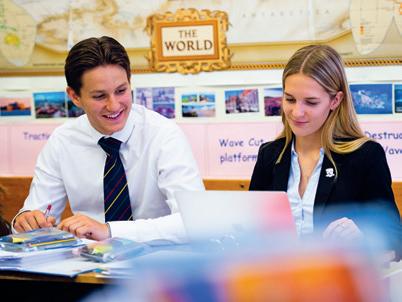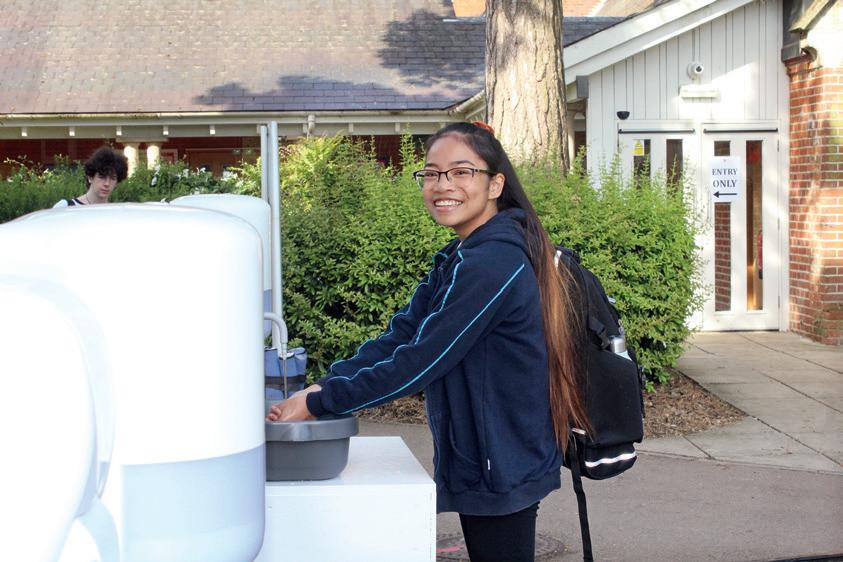
9 minute read
Headmaster’s Interview
Coronavirus caused the most challenging year in school’s post war history
The coronavirus pandemic has been a huge upheaval for us all, but just imagine the challenge facing Felsted School when Boris Johnson announced on 23 March that the UK was to lockdown to halt the spread of the Covid-19. James Garner discusses the most unusual of school years with Headmaster Chris Townsend
Advertisement
The last six months have undoubtedly been one of the toughest periods in Felsted School’s 450-year-old history. “I think it has been the most challenging time since moving the whole school to Herefordshire during World War II,” said Chris Townsend, adding that without modern communications that would have been the most extraordinary and difficult thing to do. He said that the challenges from a logistical point of view have been the hardest that he has faced. “Trying to balance care for pupils, staff welfare, being closed, reopening and of course finances as well. The school is all about education, but if we can’t make the finances work, it can’t operate.” It is a stark warning, but reflects the challenges felt throughout society. The upheaval in our daily lives has been huge, but there’s little doubt that education has been in the spotlight with children missing a large chunk of learning, the bungled release of exam results and disastrous lockdown scenes in some universities this autumn. It has had clear impacts on children and young adults, but it has also illuminated the relationship that school and education have on freeing parents to be part of the workforce. Many parents still have the scars from days of home learning, even with the help of a sophisticated and well-resourced operation such as Felsted. The move to get children back into school full time in September was welcomed by Townsend, but he warned there were some serious problems with testing. “There’s just not a quick turnaround in symptom test results which will quickly cripple schools if that situation is not improved,” he added. “It is frustrating for schools that this was not really considered, and Public Health England is steering people away from tests where possible unless you have a specific plan for how you will deal with positive tests. “I think the answer is to be a little less sensitive about schools. Schools are running their own track and trace, so I think we should trust them to identify those children impacted and their contacts.”
When I interviewed the Headmaster, the school was in its second full week of reopening, although they had been partially open since 21 August for overseas students who needed to self-isolate before term started. Overwhelmingly it has been a welcome return, he said. “The feeling of staff and pupils is that they are glad to be back.” He added it has been a long time away from school particularly for the younger children, when it feels like a lifetime. “There’s elements of normality and it’s good to see social interaction between students. Luckily, the weather was good when term started so we were able to get sports underway and that was a great relief. “The first week back the school limited the number of boarders, so we could check protocols and cleaning to make sure we were a Covid-safe environment. “We are cleaning communal areas three times as often, but in return the pupils’ personal space is being cleaned less and we are asking them to do more of this themselves, for example at the end of lessons, pupils are sanitising their own space. “So far this is going well,” he said although policing all these things is increasing the burden on the Common Room. “It is one of the things making it harder for staff. All the time we are thinking should that child be with that child, are they allowed into this room? Classes, activities and meals are organised by year group and it’s quite complicated trying to ensure the pupils aren’t mixing too much.” Lunchtime is an operation. The pupils must socially distance in the queue and wash their hands. There are elements of getting into good habits early on, but everything is taking a bit more work, he added. The restrictions have had an impact on sport being played in school. “It’s only within year groups for now and there are no fixtures with other schools. There are lots of reasons for this, but getting a group of people together on a bus does not seem a sensible thing to do.”


Matches and competitions are being organised internally within year groups. And with the good early September weather, cricket and tennis have been able to be played well into the autumn, with the girls’ and boys’ cricket 1st XIs playing matches against the MCC. “We hope to be able to get back fixtures sooner rather than later. If we cannot we need to work out how to increase competition within the school, so the boys and girls have something to work towards.” Overall having pupils in the school makes it a vastly different place, he added, and it is a far cry from the end of March. Casting his mind back six months, Townsend explained the school’s fast reaction to having to close. “We closed on Friday 20 March and by the Monday we were teaching online,” he added. The school adopted slightly different approaches for age groups. “It’s not appropriate for the young children to be online all the time, so they would have more work sheets, whereas senior pupils could effectively follow an online timetable. “In most part, the students did well with that, showed real independence and resilience. For some it was quite hard work, yet for others it worked well and for most it was as good as it could have been,” said Townsend. Felsted uses the Google platform for its online resources, which he said has developed further during the pandemic. “We realised early on that teachers delivering a live lesson to camera wasn’t the best way of doing it, so many would set a piece of work and then hold live question and answer sessions towards the end of each lesson.” He said the adoption of online learning accelerated during lockdown. “They say development happens most during a crisis and I certainly think that was the case here. The teaching profession has been pretty good at talking a good game when it comes to adopting technology, but actually everyone had to make a step change in the last few months and I think some of that will continue to have a positive impact.” He explained that in the future if a student misses some lessons through sickness, then it could be much easier for them to revisit and catch up if those resources are online. Likewise, it helps with revision and if a teacher is away at a conference, their lessons can be set remotely so students do not lose out. Townsend does not see the switch to online learning being permanent, even though an independent school launched in August that was only online learning. “I think the feeling increasingly is that pupils really value being in school. Despite the initial drift towards technology and IT being used more effectively, the importance of the personal side of education has been recognised more.”

Education has hardly been out of the headlines this summer with the other big issue being exam results and Townsend was scathing about how it was conducted: “It could not have been handled worse. It wasn’t the final decision, but it was the timing of it that was so appalling,” he added. “One or two of our pupils were hard done by and might have done better if they had taken exams,” he said. The results, he said were as rigorous and fair as could be and overall, it was a good year group that got a good set of results and the majority of Felsted leavers got into their first or insurance choice of university. “I think the big difference this year was that normally when students didn’t get the grades they were hoping for, they have to look within themselves and come to terms with the reasons. This year to be told for an exam you did not take that you weren’t good enough to get into your university of choice is tough emotionally and extremely hard to take.” He added that by the time the grades were moved up on the Monday when the Government announced it was reverting to teacher-predicted grades rather than its algorithm, the universities had almost no flexibility. “In most years if you miss your grades, there’s still a fair chance of you getting an offer through clearing. This year many universities did not have the capacity for clearing, so near misses were misses and students had to look for alternatives. “In the past I’ve always tried to encourage A level and IB students to recognise that even if they don’t get into their first choice they will end up somewhere good and they will probably look back at it as the best thing that happened.” It has been tough for this year’s final year students. The school reacted quickly when they received the news that it had to close hastily organising a leavers’ dinner on the Thursday night and a leavers’ service before the school locked down. “I feel for this year group. That last term can be that moment when lifetime friendships are formed, and they have missed other shared experiences such as sitting final exams together.” The school is trying to hold the leavers’ ball, which it was hoping to reschedule for December, however the recent spike in cases throughout the country has caused plans to change with it being pushed back to April. It has been an extremely challenging year, so what has the Headmaster learned from the experience? “We know more about our ability to deal with a really challenging situation and the community within school has really been strengthened through this. “Communication with parents and within the school has been really strong and I am hopeful we come out of this in a positive mindset. The school performed well and despite the pandemic we have 574 pupils this September, which is 15 more than last year. The overseas market has held up and our reputation grew further through the online summer school this year, which was a real winner too. “I think we can take a lot from the fact that we have seen the enjoyment of being in school, pupils wanting to be in school and parents wanting children to be in school. The hard thing is we don’t know how things will unfold this winter.”







